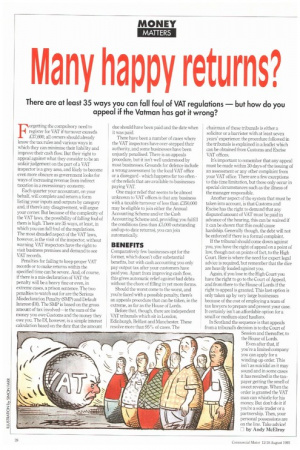Many happy returns?
Page 30

If you've noticed an error in this article please click here to report it so we can fix it.
There are at least 35 ways you can fall foul of VAT regulations — but how do you appeal if the Vatman has got it wrong?
Forgetting the compulsory need to register for VAT if turnover exceeds <£37,600, all owners should already know the tax rules and various ways in which they can minimise their liability and improve their cash flow. But their right to appeal against what they consider to be an unfair judgement on the part of a VAT inspector is a grey area, and likely to become even more obscure as government looks for ways of increasing revenue from indirect taxation in a recessionary economy.
Each quarter your accountant, on your behalf, will complete and return a form listing your inputs and outputs by category and, if there's any disagreement, will argue your corner. But because of the complexity of the VAT laws, the possibility of falling foul of them is high. There are 35 ways, at least, in which you can fall foul of the regulations. The most dreaded aspect of the VAT laws, however, is the visit of the inspector, without warning. VAT inspectors have the right to visit business premises and demand to see VAT records.
Penalties for failing to keep proper VAT records or to make returns within the specified time can be severe. And, of course, if there is a mis-declaration of VAT the penalty will be a heavy fine or even, in extreme cases, a prison sentence. The two penalties to watch out for are the Serious Misdeclaration Penalty (SNIP) and Default Interest (DI), The SIVIP is based on the gross amount of tax involved—ie the sum of the money you owe Customs and the money they owe you. The DI, however, is a simple interest calculation based on the date that the amount due should have been paid and the date when it was paid.
There have been a number of cases where the VAT inspectors have over.stepped their authority, and some businesses have been unjustly penalised. There is an appeals procedure, but it isn't well understood by most businesses. Grounds for defence include a wrong assessment by the local VAT office or a disregard which happens far too often of the reliefs that are available to businesses paying VAT One major relief that seems to be almost unknown to VAT offices is that any business with a taxable turnover of less than £350,000 may be eligible to join either the Annual Accounting Scheme and/or the Cash Accounting Scheme and, providing you fulfill the conditions (less than £5,000 outstanding and up-to-date returns), you can join automatically
BENEFITS
Comparatively few businesses opt for the former, which doesn't offer substantial benefits, but with cash accounting you only pay output tax after your customers have paid you. Apart from improving cash flow, this gives automatic relief against bad debts without the chore of filling in yet more forms.
Should the worst come to the worst, and you're faced with a possible penalty, there's an appeals procedure that can be taken, in the extreme, as far as the House of Lords.
Before that, though, there are independent VAT tribunals which sit in London, Edinburgh, Belfast and Manchester. These resolve more th; in 95% of cases. The chairman of these tribunals is either a solicitor or a barrister with at least seven years' experience: the procedure followed in the tribunals is explained in a leaflet which can be obtained from Customs and Excise VAT offices.
It's important to remember that any appeal must be made within 30 days of the issuing of an assessment or any other complaint from your VAT office. There are a few exceptions to this time limitation, but these only occur in special circumstances such as the illness of the manager responsible.
Another aspect of the system that must be taken into account, is that Customs and Excise has the right to demand that any disputed amount of VAT must be paid in advance of the hearing, this can be waived if it can be shown that this could muse hardship. Generally though, the debt will not be enforced if there is a formal complaint.
If the tribunal should come down against you, you have the right of appeal on a point of law, though not on points of fact, to the High Court. Here is where the need for expert legal advice is required, but remember that the dice are heavily loaded against you.
Again, if you lose in the High Court you have the right to go to the Court of Appeal, and from there to the House of Lords if the right to appeal is granted. This last option is only taken up by very large businesses because of the cost of employing a team of tax lawyers to prepare and present your case. It certainly isn't an affordable option for a small or medium-sized hauliers.
In Scotland the sequence is that appeals from a tribunal's decision is to the Court of Session and thereafter, to the House of Lords.
Even after that, if you're a limited company you can apply for a winding-up order. This isn't as suicidal as it may sound and in some cases it has resulted in the taxpayer getting the smell of sweet revenge. When the order is granted the VAT man can whistle for his money But don't do it if you're a sole trader or a partnership. Then, your personal possessions are on the line. Take advice!
by Andy McElroy








































































